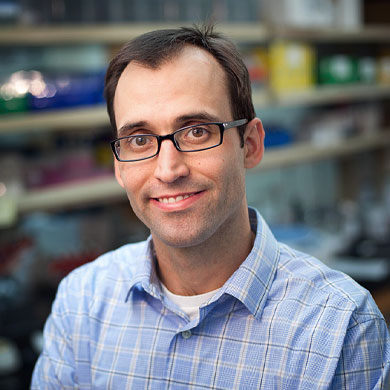
Researcher Profiles

Jeffery M. Klco, M.D., Ph.D.
St. Jude Children's Research Hospital
2018 Funding recipient
Monosomy 7 and stress-induced aneuploidy in human hematopoiesis
Discovery Research Grant 2018
PROJECT SUMMARY
Our normal cells have 46 chromosomes, which includes two copies of chromosome 1 through 22 and either an X and Y sex chromosome (males) or two copies of X (females). Many developmental disorders have an abnormal number of chromosomes, which is also called aneuploidy. For example, people with Down syndrome have three copies of chromosome 21, rather than two. Gains and losses of chromosomes are also a common feature of different cancers, including those that develop in soft tissues and in the blood and bone marrow. In particular, deletions of chromosome 7 (also referred to as monosomy 7) are one of the most frequent changes in myelodysplastic syndromes (MDS) or acute myeloid leukemia (AML) in both children and adults.
While much investigation has focused on the impact of monosomy 7 on cells, very little effort has been spent on understanding the conditions that allow for cells with only one copy of chromosome 7 to grow. MDS and other myeloid cancers with monosomy 7 frequently occur after patients have been previously treated for other cancers. In these patients, the chemotherapy given for a different cancer is felt to provide an environmental and cellular stress that allows for cells with specific mutations (such as TP53 mutations) to expand, which can ultimately lead to bone marrow cancer. Like TP53, we propose that monosomy 7 is another such mutation. We have also recently shown that monosomy 7 occurs in children as a result of mutations in two genes that are part of how cells respond to inflammation and viral infections. Thus, it appears that monosomy 7 is a common genetic change in conditions associated with stress of the bone marrow. Surprisingly we’ve observed that some children with monosomy 7 acquire additional mutations and progress to MDS and AML, while others do not develop a disease as the monosomy 7 cells can disappear over time. Considering these findings, we propose that monosomy 7 provides cells with a growth advantage but only in specific conditions, such as after certain chemotherapies, infections and cooperating mutations.
To test this hypothesis, we will use human CD34 cells to model the development of monosomy 7. We will not only determine if different cellular stressors allow these cells to develop and expand, but we will also identify different signaling pathways that influence the response of these human cells to different cellular stressors. A better understanding of the conditions that allow for monosomy 7 cells to grow will provide us with invaluable information so that in time we can develop approaches to counteract these selective pressures. Considering how common chromosome 7 deletions are in different myeloid cancers, these studies will address important issues no matter the age of the patient or the subtype of myeloid disease.
